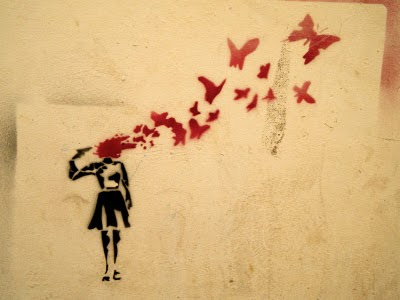ZAMEEN is the first major performance from The DAM(N) Project, a large-scale interdisciplinary art venture that connects Australian and Indian communities around the common concern of global water security. ZAMEEN presents the lives of remote communities in the Narmada Valley of North India, displaced by large-scale dam development securing hydropower for Indian cities. This holistic project integrates innovative technology, diverse community perspectives and true stories of resilience to create an immersive performance combining projections, choreography and multi-channel soundscapes.
“Three passions, simple but overwhelmingly strong, have governed my life: the longing for love, the search for knowledge, and unbearable pity for the suffering of mankind." Bertrand Russel
Saturday, September 28, 2013
Friday, September 27, 2013
चेंद्रू भी मर गए, गुमनामी में ही मरते हैं ऐसे कई नायक
चेंद्रू भी मर गए। लकवे के कारण उनका पूरा शरीर जड़ हो गया था, उमर भी कोई 76 साल हो गई थी। हकीकत तो यह है कि चेंद्रू को खुद भी नहीं पता था कि वह क्या थे? उनके पास कई यादें थीं 50-60 साल पहले की। जब देश-विदेश से कई लोग केवल उन्हें देखने और फोटो खींचने आते थे, वह अचंभित रहते कि आखिर उनमें ऐसा क्या है? आज उनकी मौत पर समाज भी यही पूछ रहा है कि उस मुरिया आदिवासी में आखिर ऐसा था क्या कि उसे याद किया जाए?
Thursday, September 19, 2013
Come And See The Blood In The Streets:Pablo Neruda
Tuesday, September 17, 2013
युगन युगन हम योगी ...
| Click the image to listen the song |
आवै ना जाय मिटै ना कबहूं
सबद अनाहत भोगी
सभी ठौर जमात हमरी
सब ही ठौर पर मेला
हम सब माय सब है हम माय
हम है बहुरी अकेला
हम ही सिद्ध समाधि हम ही
हम मौनी हम बोले
रूप सरूप अरूप दिखा के
हम ही हम तो खेलें
कहे कबीर जो सुनो भाई साधो
ना हीं न कोई इच्छा
अपनी मढ़ी में आप मैं डोलूं
खेलूं सहज स्वेच्छा
Monday, September 16, 2013
Where Are You Really from?
Sociological Cinema
In the U.S. people are often asked where they are from, but Asians, Latinos and other people of color often share the distinction of being confronted with a follow up question: "No, I mean where are you really from?" It is useful to examine what this common exchange reveals about how whites draw on race as a means of navigating and reasserting symbolic boundaries between insiders and outsiders, or between substantive citizens and non-citizens. This ridiculous scenario is humorously reenacted in the above comedy sketch, which features an Asian woman sharing a casual conversation with a white man. The man asks her where she is from, but after the woman explains she is from San Diego, the man becomes confused and attempts to clarify, "No, I mean, where are you really from?" His awkward questioning about the woman's "true" origin is a symptom of what law professor Frank H. Wu refers to as the "the perpetual foreigner syndrome." As Wu points out, when a person asks, "why aren't you married?" they are clearly signaling a measure of disapproval, and similarly, the question, "Where are you really from?" communicates something more than a curiosity about one's place of birth (see also, "My, you speak English so well!"). The question constitutes an effort to catalog a person on the basis of a perceived racial difference, but the effect of asking the question is exclusion, and as such, it can be understood as a microaggression, a term that refers to the “brief and commonplace daily verbal, behavioral, or environmental indignities, whether intentional or unintentional, that communicate hostile, derogatory, or negative racial slights and insults toward people of color” (Sue, et. al. 2007). The comedy sketch also serves as a means of broaching an important discussion about how this type of symbolic exclusion is part and parcel of a much broader historical pattern. To name just one particularly vulgar example, during the Second World War, Japanese Americans living on the U.S. West Coast were forced from their homes and relocated toconcentration camps. Irrespective of whether they immigrated or were born in the United States, high ranking military officials and state representatives joined media columnists in amplifying the viewpoint that Japanese Americans were perpetual foreigners who could not be trusted. Despite living in the United States their entire lives, many assumed Japanese Americans were not really Americans.
Sunday, September 15, 2013
Neoliberalism, or the catastrophic management of catastrophe
There is no doubt Warren Buffet was right when he said that his side is making and winning the global class war. The question is: for how much longer?
Neoliberalism is the chaotic theory of economic chaos, the stupid exultation of social stupidity, and the catastrophic political management of catastrophe.— Subcomandante Marcos of the EZLN
Sunday, September 8, 2013
Bertolt Brecht vs. House Committee on Un-American Activities (HUAC)
Saturday, September 7, 2013
"Aaj ki Raat bhaut garam hawa chalti hai" by Kaifi Azmi
 |
| Balrah Sahni Reciting the poem from movie"Sone ki Chidiya |
आज की रात बहुत गरम हवा चलती है
आज की रात न फुटपाथ पे नींद आयेगी ।
सब उठो, मैं भी उठूँ, तुम भी उठो, तुम भी उठो
कोई खिड़की इसी दीवार में खुल जायेगी ।
आज की रात न फुटपाथ पे नींद आयेगी ।
सब उठो, मैं भी उठूँ, तुम भी उठो, तुम भी उठो
कोई खिड़की इसी दीवार में खुल जायेगी ।
ये जमीन तब भी निगल लेने पे आमादा थी
पाँव जब टूटी शाखों से उतारे हम ने
इन मकानों को खबर है ना मकीनों को खबर
उन दिनों की जो गुफाओ मे गुजारे हम ने ।
पाँव जब टूटी शाखों से उतारे हम ने
इन मकानों को खबर है ना मकीनों को खबर
उन दिनों की जो गुफाओ मे गुजारे हम ने ।
Subscribe to:
Comments (Atom)
